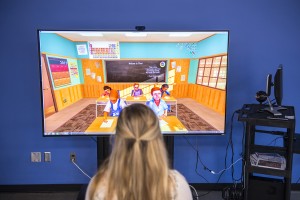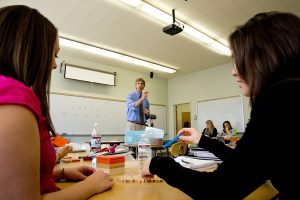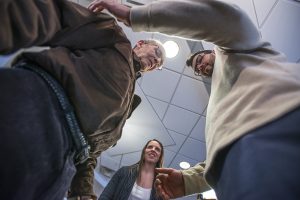2016 College of Education and Human Development Research Seed Grants
In 2016, the University of Maine College of Education and Human Development solicited proposals for up to $40,000 for 1-year research projects from its faculty members. This call for proposals emphasized potential for future scholarship and broad collaboration with other faculty members at UMaine and beyond, as well as staff and students. The seed grants support came from existing one-time funds from the college budget. The proposals were reviewed by an external evaluator; final funding decisions were then made by COEHD leadership. Below are brief descriptions of the funded projects.
Empowering a rural community to address issues of poverty and trauma: Innovative school reform and community engagement
Researchers
Ian Mette, Assistant Professor of Educational Leadership (co-Principal Investigator)
Catharine Biddle, Assistant Professor of Educational Leadership (co-Principal Investigator)
Abstract
 Childhood poverty, and the impact it has on education, has garnered immense interest in American society. However, most current policy and research attempting to address these issues are in an urban context, even though one-third of schools in the United States are rural and childhood poverty rates are higher in rural places. Thus, understanding how children experience rural poverty, how educators address student needs, and how schools and communities might better meet the needs of historically disenfranchised students, including Native Americans, is needed. Washington County is the poorest county in Maine and also home to the Passamaquoddy Tribe. As part of an ongoing university-school-community partnership, we propose a collaborative action research project to develop a greater understanding of how poverty and trauma negatively impact child development, how resilience to these factors can be fostered, and how race intersects with these issues in the rural context of Washington County.
Childhood poverty, and the impact it has on education, has garnered immense interest in American society. However, most current policy and research attempting to address these issues are in an urban context, even though one-third of schools in the United States are rural and childhood poverty rates are higher in rural places. Thus, understanding how children experience rural poverty, how educators address student needs, and how schools and communities might better meet the needs of historically disenfranchised students, including Native Americans, is needed. Washington County is the poorest county in Maine and also home to the Passamaquoddy Tribe. As part of an ongoing university-school-community partnership, we propose a collaborative action research project to develop a greater understanding of how poverty and trauma negatively impact child development, how resilience to these factors can be fostered, and how race intersects with these issues in the rural context of Washington County.
Using a grounded theory approach—rooted in cycles of observation—we intend to develop a new theoretical framework to examine the complexities of race, poverty, and trauma within rural communities. Through the support of the COEHD Research Seed Grant, this work will allow us to apply for a $1,000,000 Lyle Spencer Research Award.
Strategies for enhancing observer learning in a simulated mixed reality teaching experience
Researchers
Courtney Pacholski, Lecturer in Special Education (lead investigator)
James Artesani, Associate Dean & Associate Professor of Special Education
Laura Artesani, Associate Professor of Music Education
Annette Nelligan, Lecturer in Counselor Education
Jonathan Shemwell, Assistant Professor of Science Education and Cooperating Assistant Professor of Physics
Abstract The goal of this project is to understand how feedback can be structured to help teachers and counselors learn as practitioners, including learning by observing others engaged in teaching. Research outcomes will have implications for performance feedback in professional settings, as well as instruction. The proposed work will take place within the College of Education and Human Development’s virtual classroom, the TeachLivE lab, which utilizes innovative mixed reality simulation to bring authentic learning experiences to our pre-service and in-service educators, and school counselors. The project generates a research collaboration among faculty who are learning to use TeachLivE, and it builds upon a pilot study in the lab begun in the fall of 2015. It also supports sharing ideas with researchers from other institutions working with TeachLivE by hosting a two-day conference.
The goal of this project is to understand how feedback can be structured to help teachers and counselors learn as practitioners, including learning by observing others engaged in teaching. Research outcomes will have implications for performance feedback in professional settings, as well as instruction. The proposed work will take place within the College of Education and Human Development’s virtual classroom, the TeachLivE lab, which utilizes innovative mixed reality simulation to bring authentic learning experiences to our pre-service and in-service educators, and school counselors. The project generates a research collaboration among faculty who are learning to use TeachLivE, and it builds upon a pilot study in the lab begun in the fall of 2015. It also supports sharing ideas with researchers from other institutions working with TeachLivE by hosting a two-day conference.
Enhancing Positive School Climate with Hazing Prevention: A Pilot Study
Researchers
Elizabeth Allan, Professor of Higher Education (Principal Investigator)
Leah Hakkola, Assistant Professor of Higher Education (Co-PI)
George Marnik, Lecturer in Educational Leadership
Cynthia Erdley, Professor of Psychology
Abstract The problem of hazing in schools has been documented in the literature. Like other forms of interpersonal violence, hazing can contribute to an abusive school climate and interfere with a positive learning environment for students. Principal Investigator, Dr. Elizabeth Allan, leads national efforts to develop systematic, data-driven processes for establishing policies, protocols, and education for students and staff to prevent hazing as the college level, but this work has yet to be applied to a high school context.
The problem of hazing in schools has been documented in the literature. Like other forms of interpersonal violence, hazing can contribute to an abusive school climate and interfere with a positive learning environment for students. Principal Investigator, Dr. Elizabeth Allan, leads national efforts to develop systematic, data-driven processes for establishing policies, protocols, and education for students and staff to prevent hazing as the college level, but this work has yet to be applied to a high school context.
In response to this gap, this proposal seeks funding for a hazing prevention pilot program to translate lessons learned in higher education to a secondary context in Maine. The prevention program will include collaborative planning and consultation with school personnel, policy and protocol reviews, and tailored and evaluated hazing prevention trainings for school staff and students. A diverse group of collaborators including researchers, practitioners, and experienced grant writers is assembled to help plan, implement, evaluate, and share project results.
The pilot study design and evaluation findings will be shared throughout the state/region through established networks such as the Maine Principals Association and will provide a foundation for research publications and federal grant proposals to further examine strategies for violence prevention in high schools.
Using dynamic diagrams to model multiplication and division: A descriptive study of visual literacy
Researchers
Justin Dimmel, Assistant Professor of Mathematics Education and Instructional Technology (Principal Investigator)
Eric Pandiscio, Associate Professor of Mathematics Education (Co-PI)
Abstract This project will investigate how pre-service K-8 teachers use diagrammatic definitions of multiplication and division to explain basic facts of arithmetic. Researchers have used physical manipulatives (Green, Piel, & Flowers, 2008) and intuitive models (Jansen & Hohensee, 2015) to provide frameworks for pre-service teachers to make sense of arithmetic facts (e.g., that division by 0 is undefined) or to mitigate arithmetic misconceptions that pre-service teachers carry into their careers (e.g., that multiplication always produces larger numbers). We will investigate the extent to which classic geometric diagrams that are realized in a dynamic software environment (Sinclair, Zazkis, Lilljedahl, 2004) can be effective arithmetic representations. Because developing visual literacy skills generates new ways of thinking and communicating (Dake, 2007), it is reasonable to expect that a diagrammatic representation of the basic facts of arithmetic (McLoughlin & Droujkovas, 2013) could be a valuable tool for preservice teachers. We plan to investigate the efficacy of this representation through an interview study of pre-service K-8 teachers at the University of Maine. Our proposed investigation will be submitted for publication in the Journal of Mathematics Teacher Education, presented at a national mathematics education research conference, and used as the basis for a proposal to the National Science Foundation.
This project will investigate how pre-service K-8 teachers use diagrammatic definitions of multiplication and division to explain basic facts of arithmetic. Researchers have used physical manipulatives (Green, Piel, & Flowers, 2008) and intuitive models (Jansen & Hohensee, 2015) to provide frameworks for pre-service teachers to make sense of arithmetic facts (e.g., that division by 0 is undefined) or to mitigate arithmetic misconceptions that pre-service teachers carry into their careers (e.g., that multiplication always produces larger numbers). We will investigate the extent to which classic geometric diagrams that are realized in a dynamic software environment (Sinclair, Zazkis, Lilljedahl, 2004) can be effective arithmetic representations. Because developing visual literacy skills generates new ways of thinking and communicating (Dake, 2007), it is reasonable to expect that a diagrammatic representation of the basic facts of arithmetic (McLoughlin & Droujkovas, 2013) could be a valuable tool for preservice teachers. We plan to investigate the efficacy of this representation through an interview study of pre-service K-8 teachers at the University of Maine. Our proposed investigation will be submitted for publication in the Journal of Mathematics Teacher Education, presented at a national mathematics education research conference, and used as the basis for a proposal to the National Science Foundation.
Correlation of OptoGait System with Timed Up and Go Test in Senior Citizens
Researchers
Christopher Nightingale, Assistant Professor of Exercise Science (Principal Investigator)
Stephen Butterfield, Professor of Exercise Science
Richard Bruns, Owner, Bruns Chiropractic Clinic
Len Kaye, Director, University of Maine Center on Aging
Abstract Maine faces serious challenges associated with an aging population. With aging, the risk of accidental falls that result in injury notably increases. These injuries decrease productivity, reduce quality of life, and increase health care costs. Interventions that decrease both the likelihood and severity and injuries associated with falls could provide a marked impact to Maine and its people. The purpose of this project is to determine the validity of the OptoGait System (Microgate USA, Mahopec, NY) as a fall risk assessment tool. This will be done by examining correlations among the new optogait technology and the currently utilized Timed Up and Go {TUG) test. The TUG test has high sensitivity and specificity in fall risk prediction and is endorsed by the U.S. Centers for Disease Control and Prevention as a valid and reliable test. If OptoGait, which can identify variations in balance and gait to one-one-thousandths of a second, correlates highly with the TUG test, it may provide a more sensitive and specific test that can identify elevated fall risk earlier, thus providing more time for preventative intervention. Further research will explore best practice interventions and situation specific uses for OptoGait, such as seasonal variance in risk.
Maine faces serious challenges associated with an aging population. With aging, the risk of accidental falls that result in injury notably increases. These injuries decrease productivity, reduce quality of life, and increase health care costs. Interventions that decrease both the likelihood and severity and injuries associated with falls could provide a marked impact to Maine and its people. The purpose of this project is to determine the validity of the OptoGait System (Microgate USA, Mahopec, NY) as a fall risk assessment tool. This will be done by examining correlations among the new optogait technology and the currently utilized Timed Up and Go {TUG) test. The TUG test has high sensitivity and specificity in fall risk prediction and is endorsed by the U.S. Centers for Disease Control and Prevention as a valid and reliable test. If OptoGait, which can identify variations in balance and gait to one-one-thousandths of a second, correlates highly with the TUG test, it may provide a more sensitive and specific test that can identify elevated fall risk earlier, thus providing more time for preventative intervention. Further research will explore best practice interventions and situation specific uses for OptoGait, such as seasonal variance in risk.
WRITEscience Invitational Institute
Researchers
Ken Martin, Assistant Professor and Maine Writing Project director (Principal Investigator)
Erika Allison, RiSE Center Project Director (Co-Principal Investigator)
 Abstract
Abstract
The WRITEscience Invitational Institute will adapt the National Writing Project model for professional development of elementary-grade science teachers working to integrate writing into their programs. Eight Pre-K through fifth grade teachers will attend a two-week summer institute and complete a fall practicum implementing a STEMscopes science investigation through a disciplinary writing lens. The focus will be on science note-booking and scientific explanation. Upon completion, participants will become teacher-consultants of the Maine Writing Project (MWP). MWP and MaineESP (Elementary Sciences Partnership at the RiSE Center) will partner in conducting the program and investigating its effect on participants’ perception and use of writing within the science curriculum. This study will advance understanding of writing within the science curriculum, an essential element to adopting that scientist’s stance.
